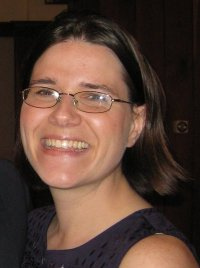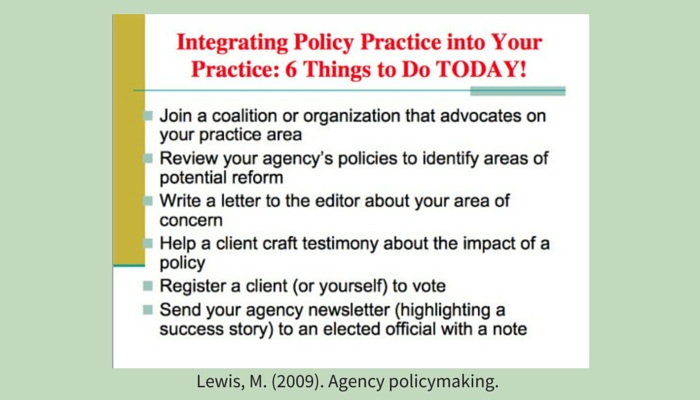Are you interested in pursuing a career in advocacy or public policy? Melinda Lewis advises you to: “Choose an organization that you’re excited about not, just a job description that sounds good… also an understanding of how policy systems work, how to build organizational strength, and how change happens.”
This week, I had the honor of interviewing Melinda Lewis, a social worker employed in the field of advocacy and public policy. Melinda is an adjunct instructor in the School of Social Welfare at the University of Kansas and has a consultancy practice in advocacy and organizing.
Some of you may already know Melinda through her blog Classroom to Capitol or her twitter handle @MelindaKLewis. It was at the request of her students that Melinda had started her blog back in May 2009. Many of her students expressed the need for having mentors in macro practice to help them grow and sustain their careers once they graduate.
The blog has also served as good discipline for Melinda in that it ensures she reads the latest commentary and research on advocacy, organizing and non-profit development. Furthermore, she has found it beneficial in terms of networking; i.e., building online relationships with leaders in her three primary areas of interest.
What made you decide to pursue an MSW in general? (with your focus on public policy)?
I think that I was drawn to the public policy emphasis even before the MSW decision, really. I knew that I wanted to work on the macro level, but I feel strongly that policymakers should be connected to the lives of those most impacted by policy changes, and to be embedded in those communities.
An MSW gave me better skills in policy analysis, program evaluation, and work with communities…and the advanced degree that you often need to get in the door.
Can you briefly walk us through your career progression?
After I got my BSW, I went straight to graduate school, earning a MSW from Washington University in St. Louis. There, I started a Spanish-language crisis hotline, worked on political campaigns, and lobbied the Missouri legislature on behalf of older adults.
When I graduated, I took a job, Director of Policy Advocacy and Research, at El Centro, Inc., creating a community organizing and policy advocacy “arm” of that medium-sized social service organization. I held that position for about 6 years, when I left to teach and consult, which works well for my family at this particular stage.
What are the various activities you engage in to make a difference in the public policy advocacy/lobbying and community organizing arena?
I am also a full-time mother at this point in my life, with 3 children ages 4 and under, so my work in advocacy and organizing are now mostly within my consulting practice, my teaching, and my own volunteer work. I serve on the Board of 2 organizations related to public education policy, and I also volunteer for a workers’ rights organization, an agency that serves families experiencing homelessness, and an immigrant rights group.
I also use my teaching, student advising, and my blog to excite students about macro practice, as an extension of that work.
Did you know when you graduated from social work school that you wanted to teach?
No, not at all! I taught sporadically while I was still working full-time (as Director of Public Policy and Research for an immigrant social service and immigrant rights organization, where I led lobbying and grassroots organizing campaigns on issues related to immigrant students, immigration reform, economic justice, and pro-family policy), but I really started to teach in earnest after I quit my full-time job when my oldest son was about 10 months old.
I was traveling extensively at the time, and I needed a job that would allow me to play a more active role in his life. I was delighted to come back to the school where I received my BSW to work with students interested in community and policy practice.
Does teaching at the University level require a doctorate?
Not for adjunct instructors, at least at my university. I bring, to the classroom, a wealth of field experience and an academic commitment to connecting students to research and scholarship in macro social work.
I understand that you also do some consulting work for nonprofit organizations, helping them to build and implement advocacy strategies. In layman’s terms, what does this mean and/or could you give an example of a project you have worked on?
I provide nonprofit organizations with some of the policy assistance that they can’t afford to hire someone to do full-time, usually. I’ve conducted an evaluation of an advocacy training program for a foundation, served as a sort of “advocate on retainer” for a local nonprofit (doing training for their Board and analyzing legislation and working with their staff), provided capacity-building assistance in community needs assessments for a network of anti-poverty organizations, and I do a lot of public speaking, especially around issues of advocacy and immigration policy.
They are mostly time-limited projects, and my goal is to build the organization’s overall ability to integrate policy and grassroots work into their operations, so that I’m leaving agencies stronger than when I started with them.
How did you learn to do public speaking? Did you take some sort of class/training or were you a natural at it?
I don’t remember doing any sort of training, so I guess I feel that it comes fairly naturally. I see every public speaking engagement as an opportunity to connect with people around something that I care about–not just communicating knowledge but inciting some passion.
I’ve certainly had my share of speaking failures (I’ve even been kicked out of a church, once!), but, when you feel that you’re saying things that must be said, at least for me, some of the nervousness subsides.
 What are the parts you like best about teaching and your public advocacy work?
What are the parts you like best about teaching and your public advocacy work?
My favorite part about teaching, absolutely, is seeing students get excited about how they can make a difference through policy and advocacy. I’ve had several students take on successful advocacy projects, and I feel more authentic delight in seeing those victories than in some of my own greatest triumphs.
My favorite part about advocacy, myself, is the chance to stand with others for what is right, to help to create a just society that I want for my kids, and to do so in a way that demonstrates commitment to justice and belief in the power of people.
And what are the parts of your work that are the most challenging?
For me, one of the greatest challenges is that which is universal to all working mothers–finding a way to meet the needs of my kids and fill my own soul (and keep our lights on!) through work.
What career advice would you offer upcoming MSW graduate students interested in pursuing a career in public policy/advocacy?
Choose an organization that you’re excited about, not just a job description that sounds good. You’ll need skills in working with people, which most social workers find somewhat natural, but also an understanding of how policy systems work, how to build organizational strength, and how change happens.
It’s important to have internal motivations, since change can be slow and incomplete, especially in policy arenas.
And don’t feel that you have to know everything before you start; social change is a journey, one that we’re privileged to embark upon alongside those we serve, and there’s nothing wrong with learning as you grow–we all do!
Thanks so much, Melinda, for providing us with a glimpse into the advocacy and public policy field of social work!
As always, please feel free to share your thoughts and comments, as well as any questions you may have 🙂 I really appreciate hearing from you!
Reference: Lewis, M. (2009). Agency policymaking.





Thanks for a passionate glimpse into this type of social work Melinda. I especially like how you have carved out a consulting practice in this field of practice so you can be there for your family, too. So many of the models for advocacy/public policy work in our culture are people whose lives are all consumed by that work.
Also, I really love your suggestion to look for an organization that you’re excited about when you look for a job. As I follow the work of our graduates, it seems to me that the ones who are happiest are those who feel passionate about their organizations and about the impact that they have on the organization.
Thanks, Nancy! In some ways, I’m another one of those full-time advocates whose life got squeezed out by the demands of the cause(s)–I would love to still be full-time on the front lines of advocacy, so to speak, but it just didn’t allow me to be the mom I want to be. I’m so lucky to have landed in a career that lets me still have some impact while guarding some of this time for my young children. I was just guest lecturing last night in a BSW class and talking about the “choose an organization, not a job description” advice, and I think that it resonated with many of them, too. I appreciate your interest and your comments!